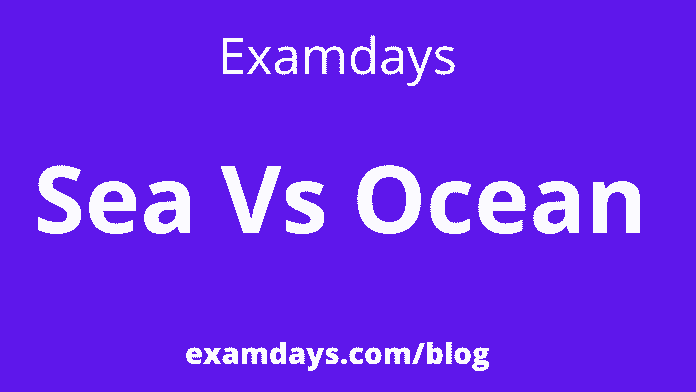Sea Vs Ocean: Are you looking for the Ocean vs sea, then you are in the right page for the difference and comparison. The detailed information is available for competitive exams and general knowledge purpose.
Check the sea vs ocean complete information along with separate info for Sea and Ocean terms and conditions. The details were listed out for candidates’ reference purposes.
Sea vs Ocean
The sea is a body of salty water covering 71 percent of the Earth’s surface. It is an essential part of the water, carbon, and nitrogen cycles, and humans have harnessed and studied it since ancient times.
What is the Sea?
The sea indirectly provides substantial supplies of food for humans and is also used for trade, mineral extraction, and power generation.
In seawater, there are several ions besides sodium and chloride, including magnesium, calcium, and negative ions such as sulfate, carbonate, and bromide.
The sea plays a major part in the water cycle by evaporating water from the ocean, sustaining life on land, and returning to the sea.
The sea level has been rising for at least the last 100 years due to climate change, and the melting of snow and glaciers, and the extraction of groundwater for irrigation and other agricultural and human needs.
What is an ocean?
The two terms ‘sea’ and ‘ocean’ can be used for similar or the same purposes, but an ocean is a larger body of water.
An ocean is a large body of salt water that covers most of the Earth’s surface and is also known as a very large area of ocean.
It’s hard to imagine, but 97 percent of Earth’s water can be found in our oceans. Of the small percentage that is not in the ocean, two percent is frozen in glaciers and ice caps. Less than 1% of total water on Earth is fresh and good. Remaining tiny fraction part of the water is in our atmosphere is water vapor.
Differences between Sea and Ocean
| Ocean | Sea |
| The largestwaterbodies on the earth are called Oceans. They contain more than 230,000 marine species. | Sea is described as a division of an ocean or a large body of salt. They are smaller than oceans |
| They are not enclosed by land. | They are partially enclosed by land. |
| According to the International Hydrographic Organization, there are five seas (in decreasing order on the basis of their area)- Pacific, Atlantic, Indian, Southern (Antarctic), and Arctic oceans. | Major seas are- the Mediterranean Sea, South China sea, Caribbean sea, Baltic, Berring, Black, Coral, North, and the Red Sea. |
| Oceans are interconnected water bodies, sometimes also known as the world ocean or global ocean. | They sometimes may or may not be connected to an ocean. |
| Their depth ranges from 13,000 feet to 36,000 feet. | They are usually located near land and are used to connect the land with the ocean. |
| Oceans have currents (ocean currents) which help in balancing the temperature of earth surface. | Seas are associated with heavy waves that are not visible in oceans. |
What are the similarities between the Ocean and the sea?
- They are all salt water and are all connected.
- The Oceans are larger and actually makeup one Global Ocean, while the Seas are smaller and surrounded by land with a connection to the Ocean.
- Oceans are often referred to as The Sea.
Conclusion:
Seas are generally smaller and shallower than oceans. An ocean is wide and continuous body of salty water that shelters about 70 percent of the Earth’s surface, while an ocean is a large body of brackish water that covers most of the Earth’s surface but is smaller than an ocean.
Examdays Article Agenda

